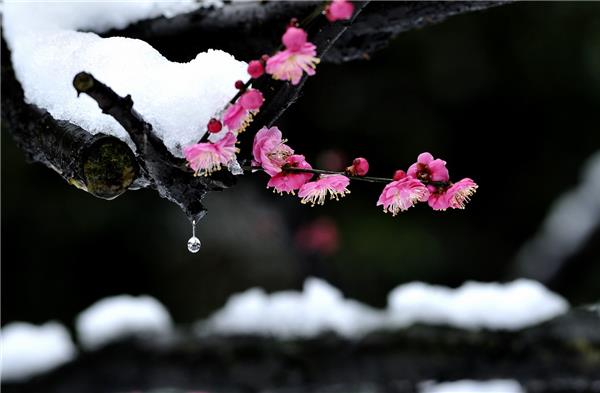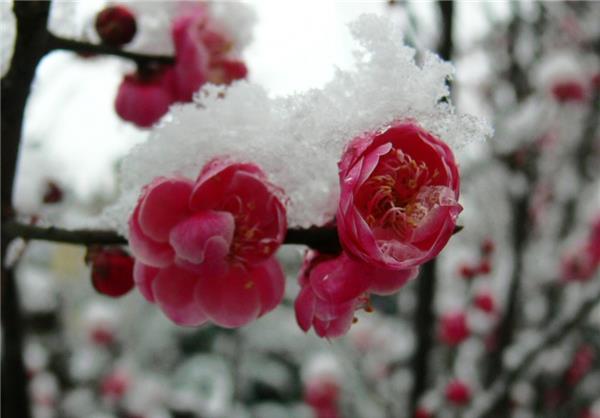Grafting breeding of red plum seedlings and the difference between red plum seedlings and wax plum trees
Red plum is a kind of tree species with high ornamental value. Although it is called red plum, there are not only red flowers, but also white and pink flowers in red plum varieties.

Introduction of Hongmei
Morphological features: deciduous small trees or large shrubs. The crown of the seedling opens. The new tips are smooth, green or reddish brown. Leaves alternate, broadly ovate to ovate, 4-6 cm long, margin denticulate, covered with pubescence on both sides when young, and then gradually deciduous. Flowers born in the axils of one-year-old branches and leaves, solitary or two clusters, white, red, pink and other colors, single to double, with fragrance. Stamens numerous, filaments longer; pistil one or more. Drupe nearly spherical, with longitudinal grooves, green or dark red when young, yellow when ripe, sour in taste. Double varieties do not bear fruit or have little fruit. According to the climate of the planting area, the flowering period is from December to April of the following year, and the fruit ripening period is from May to June.
Garden uses: plum blossom exuberant quaint, sparse branches horizontal oblique, early spring stamen, dark fragrance floating, Su is known as one of the three friends of the year. In the garden green space, garden scenic spots can be isolated, cluster or group planting, can also be planted in front of the house, slope, stone, roadside natural planting. If the evergreen trees or dark buildings are used as the background, it can set off the beauty of jade and ice. Use plum blossom to make bonsai, Qiu twig twists and turns, full of lovely. Flower branches can be cut into cut flowers.

The difference between red plum seedlings and wax plum seedlings
1, the flower color is different: wax plum blossom is mainly wax yellow, while plum blossom has white, pink, Shenjiang, purplish red and other colors.
2. The florescence is different: generally, wax plum blossoms in the twelfth month of the lunar calendar, about two months earlier than plum blossoms.
3. The crown is different: Chimonanthus is a shrub, with clumps of branches, erect branches, well-developed root neck, massive, while plum blossoms are trees with trunk, up to 10 meters high, often with spines, branches in addition to straight branches, and vertical branches, and the crown is irregular round head shape.
4. The leaves are different: the leaves of Chimonanthus are opposite, subleathery, long-oval, entire, the upper surface is rough and green, and the back is smooth and gray; while the leaves of plum blossom alternate, the leaves are broadly ovate to ovate, 4-10 m long, the apex is long acuminate or caudate, the margin is sharply serrate, the base is broadly cuneate or subrounded, both surfaces are pubescent, and then more deciduous, the new leaves that are growing are hairy only on the veins on the back of the leaves, but mostly in the axils.

Grafting cultivation techniques of red plum seedlings
1. The best brick wood for grafting red plum is green plum seedlings. The small door to distinguish whether the seed is true or false, the shell of the green plum seed is knocked open, and the nuts are soaked in warm water for more than 24 hours. the color of the false seed is a little yellow in white, and there is no color yet, and the color of the real seed is very white like that kind of horseshoe white. Plum blossoms can also be planted, propagated and striped, but the survival rate is low.
2. Red plum likes light, warm and humid climate, and is more cold-resistant; the soil is fertile, loose and humus-rich sandy loam, where the soil is sticky and poorly drained, the root is easy to rot and die. Therefore, plum planting should choose a place with sunny drying and good ventilation. The best time for red plum grafting is when the leaf buds sprout after the plum blossom blossoms.
3. Bud grafting: Bud grafting is the most widely used method in grafting, and its specific grafting methods mainly include xylem bud grafting and T-shaped bud grafting. The method of bud grafting with woody parts is also called embedded bud grafting, which is widely used in daily life. Its advantage is that it can be grafted all the year round, which is not limited by whether the branch is detached from the skin; because the wood in the bud does not damage the vascular bundle in the bud, the survival rate of grafting is high and the growth potential of seedlings is strong.
4. Management of bud grafting: generally check whether the bud survived or not about 15 days after grafting. The surviving buds can be unbound in 25 days, and the rootstocks will be broken at the same time from 3 to 5 cm on the buds. When the grafted buds germinate and grow, cut the rootstock at the left and right of 0.5 cm above the grafted buds. The cut is tilted slightly to the opposite side of the bud to facilitate healing. Those who do not survive should be picked up in time.

The greening ways of red plum can be isolated planting, cluster planting, group planting, etc., or they can be planted naturally in front of the house, on the slope, between stones and by the roadside. Evergreen trees or dark buildings can be used as the background to set off the beauty of plum blossom. In addition, plum blossoms can be arranged as Meiling, Meifeng, Meiyuan, Meixi, Meijing and so on.
Related
- Wuhan Hospital Iron Tree Blooming Result Was Instantly Frightened by the Gardener Master
- Which variety of camellia is the most fragrant and best? Which one do you like best?
- What is the small blue coat, the breeding methods and matters needing attention of the succulent plant
- Dormancy time and maintenance management of succulent plants during dormancy
- Minas succulent how to raise, Minas succulent plant pictures
- What are the varieties of winter succulent plants
- How to raise succulent plants in twelve rolls? let's take a look at some experience of breeding twelve rolls.
- Attention should be paid to water control for succulent plants during dormant period (winter and summer)
- Watering experience of twelve rolls of succulent plants
- Techniques for fertilizing succulent plants. An article will let you know how to fertilize succulent plants.



